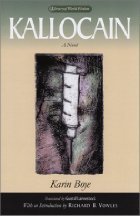What do you think?
Rate this book


193 pages, Paperback
First published January 1, 1940
From thoughts and feelings words and actions are born. How is it possible that thoughts and feelings are the private property of the individual? Does not the whole fellow soldier belong to the state? To whom do his thoughts and feelings belong if not the state? Until today there was just no way to control them – but now the agent is found.The dystopian world (or utopian, depending from where you look at it) is impressively portrayed. The author was clever enough not to overload the story with too much technical stuff that is either incomprehensible, or has become outdated already. The story focuses on the main character, his psyche, and its immediate surroundings. From the first page the reader knows that Kall is serving a long sentence and he tells his story from prison. One of the questions is why. The answer is not revealed until the very end and it was not what I thought it was. And then there is some kind of afterword that gives the book an additional and unexpected twist. This finally gave the book its fourth star.
(translated by me)

Lo Stato è tutto, il singolo niente.
Sulla copertina campeggia una parola all’apparenza stranissima, Kallocaina, si tratta di un potente siero della verità che induce a confessare i segreti più reconditi e di cui gli organi di polizia, attestata la sua efficacia, si serviranno in maniera smodata. Il romanzo si basa proprio sulla sperimentazione di questa sostanza su ignari volontari e il tutto ci viene raccontato dalla vivavoce del suo inventore, Leo Kall, sotto forma di memorie. Scopriremo così le sue più intime riflessioni, trovandoci dinanzi ad una mente “omologata” e soggiogata volta al servizio dello Stato. Egli, a poco a poco, comincerà a prendere consapevolezza sulle mille insidie della sua invenzione che porteranno alla luce percezioni, insite nell’uomo e oramai sopite da tempo immemore, che lo travolgeranno in pieno come uno tsunami.Per la prima volta nella mia vita avevo la consapevolezza di cosa fosse il potere, lo sentivo in mano come un’arma — ed ero disperato.
Angosciante e visionario, un romanzo dove l’autrice non ha avuto bisogno di scendere nei dettagli, inserendo dei futili orpelli stilistici, per tinteggiare l’oscurità che domina questo mondo distopico, catturando le inquietudini che vi aleggiano con pochi semplici tocchi.